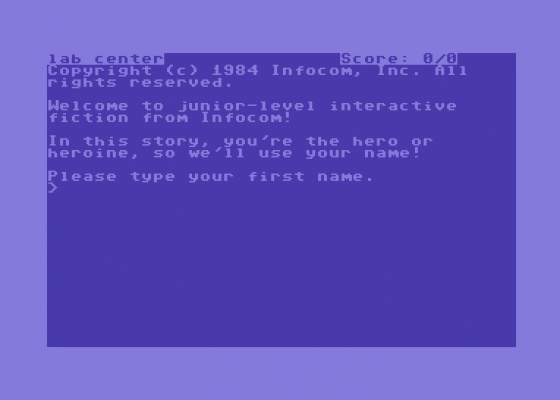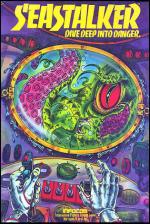
Computer Gamer
 1st June 1985
1st June 1985
Categories: Review: Software
Author: Gordon Hamlett
Publisher: Infocom
Machine: Commodore 64/128
Published in Computer Gamer #3
Infocom are the undisputed leaders in text adventures. Gordon Hamlett examines their range in his first look at adventures for the Commodore 64
C64 Adventures
Life is becoming very interesting for C64 owners. Not only do they have an ever increasing base of British software available to them, but also, large amounts of American software are now appearing on the scene. Whereas previously, games from the States could only be obtained from a few specialist stores who had imported them, top titles are now becoming freely available under such labels as US Gold, CBS, Ariolasoft and Commodore themselves. For adventure fans, this is great news. The bad news though is that you will almost certainly have to buy a disk drive to enjoy a lot of these transatlantic treats.
You cannot get very far when talking about American adventures before mentioning Infocom [I'm surprised it took him 'til the second paragraph - Ed]. They have justifiably acquired themselves a reputation of being producers of the world's best adventure games. If that sounds as though I am secretly in their pay, then let me try and explain.
To start with, the games are text only. Not for them, a few lines of description, but pages of it. It is very well written, funny and, most important of all, totally convincing. This applies to the whole of the storyline which fits together beautifully and reads as if it has been written by a professional author rather than a computer programmer. The text also contains essential clues and so must be read very carefully. I would recommend reading a description at least twice. Once fairly quickly to get the general feel of things, and then a second time slowly to glean all the extra bits of information.
So what are these wonderful games? The most famous ones and the ones that started the company going are the Zork trilogy. Set in the Great Universal Empire (a land which I now totally believe in!), the games are independent of each other and can be played in any order although it would seem logical to start at the beginning. This gives you an extra advantage later on as you may gain an additional clue or two. For example, there is an oblique reference in Zork I as to what happens if you go round saying "Hello, sailor" but it is not until Zork III that you come across a gentleman of the sea.
Whilst the task of collecting twenty treasures in Zork I is not exactly original, the problems associated with getting them are. Amongst other things, you have to learn how to operate a dam and perform an exorcism. Other games feature a thief who robs you of your treasures but only in Zork do you have to use his special skills to help you. In Zork II, you get to meet the Wizard of Frobozz, a somewhat dotty old man who will attempt to cast assorted spells over you and so hinder you on your way whilst in Zork III, you have to find and overcome the Dungeon Master himself.
One of the lovely things about the games is the way in which they have anticipated most of the "wrong" answers. Instead of just saying "You can't do that", they make fun of you when you try something stupid. If something is logically possible, then you can do it. (So many games do not cater for things like your burning desire to stand on a table.) It may not get you anywhere, but in Zork, you can do it. The parser (the bit of the program that understands your input) is very detailed and sentences such as "Drop everything except the hot pepper sandwich" are fully understood. There is always a lot of material to read within the game such as leaflets, books of matches, bibles, etc and again, everything should be read carefully. Half of them will be adverts for other Infocom products but the other half will contain vital clues.
If you like more magic in your fantasy games, then take a look at Enchanter and Sorceror. To help you in your attempt to rid the land of evil, you have a spellbook at your disposal. Further spells can be found along the way, usually written on a scroll. It is normal then to try and write the spell into your book from where you can use it again and again but some spells are so powerful that they can only be used once by reading them off the scroll. Working out which spells to use where is great fun and you soon get used to the strange names of the spells such as gnusto, izyuk and frotz. These games could almost be called Zork IV and V and the use of magic adds an extra dimension.
Perhaps you prefer science fiction or fantasy. If so, there are four titles to keep you amused. Starcross puts you in charge of a spaceship in the year 2186 on a search for black holes. Everything is going all right until you come across a giant space ship full of strange aliens... In Planetfall, you are playing the part of a mental galactic crewhand when your ship explodes and you manage to escape to a strange world. Out of the frying pan and into the fire as the planet also needs saving.
Fortunately, you soon come across a small mischievous robot called Floyd to help you on your way. Robots also play a large part in Suspended. Something has gone drastically wrong on your ship and you get awakened from your cryogenic capsule in order to put things right. You do this by controlling six robots, each of which has a different function. Iris and Auda act as your eyes and ears respectively. Waldo will manipulate things for you, Sensa will analyse various emissions whilst Whiz acts as an interface between you and the data bank. My favourite though is Poet who, when he is not actually touching something tries to make the best of his surroundings. The result is some wonderful hippy-type outpourings.
Getting six different views of the same area makes fascinating reading and the game has one of the most original storylines I have seen. The fourth sci-fi came is the newly-released Hitchhiker's Guide To The Galaxy. As a review follows this article, I won't say much about it. Suffice to say, it is well up to Infocom's usual standards and is very funny indeed.
If you are one of those people who always claim to solve who-dunnits before the last page, you have the chance to prove it with Deadline and Witness. Here you have twelve hours to question suspects and analyse clues before arresting someone. Different actions take varying times to complete. For example, if you examine something carefully, it will take longer than a cursory examination. You can ask people about other people or objects. You can accuse them, trying to get clues from their reactions and finally you can arrest someone. You will then be assessed on your performance. Just to make life more difficult for you, the suspects are living their normal lives, moving around - and trying to cover up the evidence.
Just in case you have still not found a scenario that suits you, you could explore a lost pyramid in Infidel, tangle with pirates in Cutthroats or explore under the ocean with Seastalker.

All Infocom's games are beautifully packaged. You don't just get a disk with a few introductory notes. For example, in Witness, you get a copy of National Detective Gazette, a suicide note, a telegram, a copy of a local newspaper and a book of matches complete with scribbled message. The package is completed with booklets advertising other Infocom products and the whole package is contained in a wallet somewhat larger than this magazine.
Before you rush out and buy all the games, there are however two drawbacks. First, the games are not cheap (£30-£40) especially with the strength of the dollar against the pound and secondly, as mentioned earlier, you will need a disk drive. To alleviate the price problem, Commodore have produced six titles under licence. These games are Zork I, II and III, Starcross, Suspended and Deadline. At a price of £11.99 these must represent value for money. As for the disk drive, more and more software, especially American software, is being produced on disk only and it is a medium that will become increasingly important in the games market.
There is a story doing the rounds about people who have bought a BBC just so that they can play Elite on it. Infocom games are so good that I would suggest it is worth buying a disk drive just so that you can play them.
Infocom adventures are also available for the Atari, Apple and IBM PC.











